Most rugby league articles these days can be categorised as simple diatribes, lacking any real analysis and objectivity. And God forbid a solution is offered. No, it is seen as best to harp on about the same thing (like ‘diving’) on a yearly basis. It’s madness. It’s rugby league.
It’s even worse when statistics are used to arrive at a conclusion, when the use of those statistics in the analysis is so irretrievably wrong.
Statistics are an important feature of modern life and sport. They can mean everything, or they can mean nothing. Wielding any set of numbers to support a case relies on careful consideration of causation, correlation and so on.
If you can’t support the conclusion with the full data set (only by cherry picking, and even then, not doing a very good job), it’s called having an agenda. Politicians and polemicists have mastered this technique, as you no doubt have witnessed throughout the election campaign so far.
This brings me to an ABC article that I came across over the weekend, which is another in a litany of poor thought processes, and conclusions borne of dubious analysis, particularly the misapplication of causation. It is proof that numbers and journalism do not always mix.
It was so poor and objectionable that I had to stew on it for a day just to make sure I hadn’t missed something of seminal importance and brilliant insight … And to let the Grant Burge Shiraz wear off.
Now that it has (mostly), I find my initial reaction to be unchanged.
I’m actually glad I saw it because I had been planning to delve into why it is that the Roosters are so heavily penalised after updating this chart: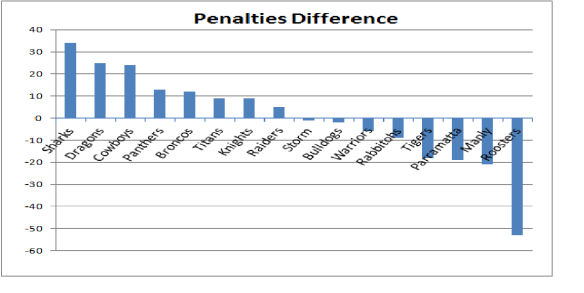
You can see the discrepancy for yourself. It is an embarrassment to the NRL.
What it is implicitly saying is that the Roosters (and, to a lesser extent, Manly) are so poor at building pressure that they cannot earn penalties from offside or ruck infringements (I’ve been to live games of both, and I can attest to this being untrue). And yet, the Dragons and Cowboys are just so darned good at it!
Given the Roosters and Manly are at the top of the ladder, the evidence suggests they can, in fact, do so. Look at the data on relative tries scored to see just how unsuccessful these teams are: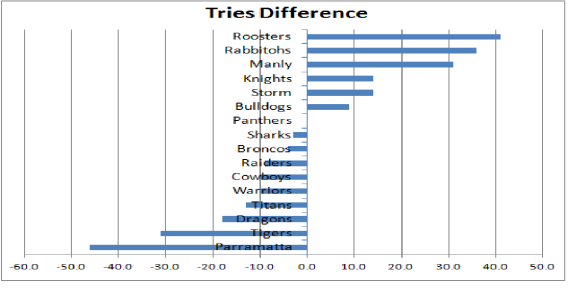
They’re just woeful, right? Or maybe they’re just lucky?
In any case, recent remarks by the NRL hierarchy don’t betray any concern whatsoever, preferring to erect smokescreens to hide the game’s deficiencies. No one is being fooled. Further, the view has been expressed that penalty counts don’t influence games. I’m guessing millions of league followers would disagree.
Anyhow, onto the article, where the question posed was whether the Roosters’ (and Manly’s) defensive success is an outcome of the high penalty counts recorded against them. Say what? They’re successful because they give the opposition far more possession through penalties?
It’s preposterous on its face, and akin to surmising that David Boon was a magnificent opening batsman because he drank an awful lot of beer.
If the writer is arguing that the Roosters (and Manly) have become better defenders by doing more of it, then sure, they’re getting an awful lot of practice! Or if giving the opposition extra use of the ball means they have to make more tackles, then duh, of course.
But is it the basis for their success, as posited by the ABC? It’s hard to imagine that it is. After all, you don’t score without the ball, meaning it’s far harder to win games, particularly in the modern era where penalties (or just mistakes) often lead to tries within a couple of sets.
The fact is that the Roosters and Manly have had to post superhuman defensive efforts because of the lopsided penalty counts against them. They are successful in spite of them, in other words. If it were any other way, they would not be well entrenched in the Top 4, and they would not be credible contenders for the Premiership. You do what you gotta to do.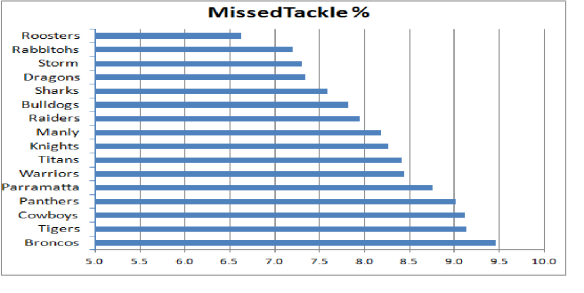 The article goes on to say:
The article goes on to say:
“Roosters coach Trent Robinson said recently he was concerned about his side’s high penalty count and that he intended to discuss it with referees boss Daniel Anderson.
Given his sides results it is hard to understand why Trent would be concerned. Anderson would probably tell Trent that the stats point out:
1. His side frequently is seen to hold down the tackled player;
2. His team is seen often to interfere with the play the ball; and
3. His players are frequently seen to be offside.
In short, it could be argued that the Roosters play a brand of football that consistently tries to slow down their opponents’ attack.”
Once again, an absurd assertion that implies the Roosters are more than happy to tire themselves out to slow down the opposition.
It strikes me that exhausting oneself tends to slow you down, and means that when you do actually have possession, you will be tired, on the back foot, ineffective, under increasing pressure and, more than likely, offside on the scoreboard.
The article has one thing right. James Maloney can hang on tighter than a Scotsman to his wallet at times, even when he really doesn’t need to.
But the Roosters’ coach, along with little Toovs, might ask different questions:
1. Why do we not attract more penalties for the opposition holding us down in the same we are found guilty, when there is clear evidence of them doing so? Not to mention similar incidents in other games played over the same weekend?
2. Ditto, but with respect to interfering in the play the ball.
3. Why is it that we work hard to play the ball quickly and catch the opposition offside, yet are not rewarded for it? Please explain how it is different to the penalties blown against us?
Asking in this way might be implicitly accusative, but not explicitly. These questions are designed to illicit detailed answers.
When I fail to see any major differences between teams in any particular match, it’s hard to understand penalty counts in favour of one team that are measured in multiples of two to three.
Looking at net penalties as a ratio, the picture is not a lot prettier for the Roosters, though Manly are closer to the pack: 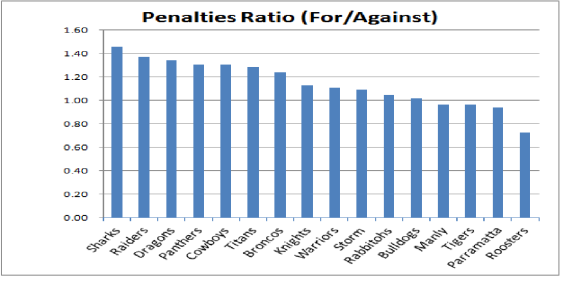
The article concludes, in true Yes, Prime Minister fashion:
“The stats show that Manly is not far behind the Roosters in all of these regards. You just need to look at the NRL ladder to see that there is no big downside for either team in conceding so many penalties.”
As Sir Humphrey might have put it when defining politicians’ logic:
“All cats have four legs. My dog has four legs. Therefore, my dog is a cat.”
And the evidence produced for such an embarrassing theory?
“The other sides in the top four – Melbourne and the Rabbitohs – score almost as many points as The Roosters. But both give away far fewer penalties and concede a fair few more points. A coincidence?
Sorry? What’s the coincidence here? Did it ever occur to our wayward and subjective writer that teams need to be demonstrably better to overcome the weight of penalties?
“The Storm in fact concede the second fewest penalties in the NRL after the Sharks. What reward – apart from a lower ladder position – do the Storm and the Sharks get for having such good discipline?”
So, he’s trying to make his penalties/ladder case based on teams coming first and third. I see ….
On this logic, the Roosters have been monumental underperformers. They should have been in the Grand Final for the last decade, along with Manly (or whichever team had achieved the feat of being penalised into near extinction).
Because, really, success in sport has very little to do with work ethic, talent and desire, does it?. Clearly the secret lays in erecting what most rational people would consider to be insurmountable barriers out of sheer bloodymindedness, then somehow overcoming them.
But like Demtel, there’s always more. We are then treated to what can only be interpreted as designed to prod referees into penalising these two teams further:
“In spite of these two teams appalling rate of penalties conceded, neither has had a player sin binned in 2013.”
No, though (the Roosters’) Jared Warea-Hargreave managed to be the only player sent from the field for an act that was preceded and followed by far graver incidents. And the Melbourne Storm continue to be shepherded through the competition by referees who cannot seem to bring themselves to penalise them for blatant fouls. The so-called Big 3 have been culpable on several occasions this year without sanction, the latest being an obvious sin-binning infringement by Cooper Cronk against the Knights on Sunday that … well … wasn’t.
Why? Nobody knows, but everyone suspects.
Why was Billy Slater not sin-binned when knocking out Antonio Winterstein in an earlier round with an obvious high shoulder charge? Clearly, referees logic extends to ‘two wrongs actually do make a right!’
But it gets better:
“Daniel Anderson must instruct his refs to use the sin bin for repeat infringers. Any player who concedes three penalties in a match should go to the sideline for 10 minutes.
The refs should have even less tolerance for known regular offenders who should go to the bin after conceding two penalties.”
Ahh, the three strike policy, in combination with targeting and profiling. That’s served society pretty well, hasn’t it?
Now, I’m all for solutions as opposed to some of the drivel served up my mainstream media outlets that are purely a yearly rehash of a persistent issue (like the topical diving as alluded to above) without a single idea as to how to counter it. This is what I mean when referring to the ability of rugby league to ‘naval gaze’. A narrative or commentary without some creative foresight, is just a waste of time.
But at least this is an idea, if I were to be charitable. And yet, how can we have a rule such as ‘three times and you’re in the bin’ when the referee is the sole arbiter of who he penalises? They can’t even bring themselves to sin bin Cooper Cronk, or Josh Reynolds for ‘clear as day’ professional fouls. They can’t even bring themselves to sin bin Krisnan Inu for a spear tackle on (arguably) the game’s most important player. Or Richie Fa’aoso for two spear tackles on the same player in the same game!
And yet, the brilliant prescription is to sin bin a player because the referee penalises them for, say, slowing the play the ball a couple of times, seemingly oblivious to the fact that he has called ‘held’ midway through a bunch of grown men in mid fall toward the ground. What would he have them do? Circumvent the force of gravity? Clearly they are unaware of the theory of gravity as made famous by Clint Newton and Albert Kelly.
We can’t even get a sin bin for leg twists and testicle grabbing, two of the grubbiest acts a player can commit without springing for dinner. And which only attracted single week suspensions (Burgess had loading), which means the ABC author pretty much equates all these things with a few penalties.
I cannot take issue with the easily identifiable examples. Penalise them, no problem. But once again, I’ve sat through games where a defender has been penalised due to the superb theatrics of the man playing the ball, often including walking up to two metres off the mark in order to do so. Rather than give the attacking team the penalty, this is a clear example of referees not applying the rules (not knowing them if you ask me). If the man with the ball walks off the mark, penalise him … Or, in the spirit of the flow of the game, don’t penalise the marker for being offside. Simple stuff. Low hanging fruit. Reckon they can get it right?
Phil Gould has even brought up the idea that the Storm gave away penalties on purpose on the weekend in order to disrupt the Knights’ attack, and that he will be watching it in coming weeks. Seems to me the Knights would be considered poor exponents of their craft if they got worse with more opportunity. I suspect it’s the other way around.
Give me a break.
Other than achieving the feat of noticing the fact the Storm won the match with less than 50% ball (for a change) and failing to notice the Roosters have done it all year, the idea that the best teams will consistently give away penalties (and therefore ground and possession) as some sort of lifestyle tactic is without foundation.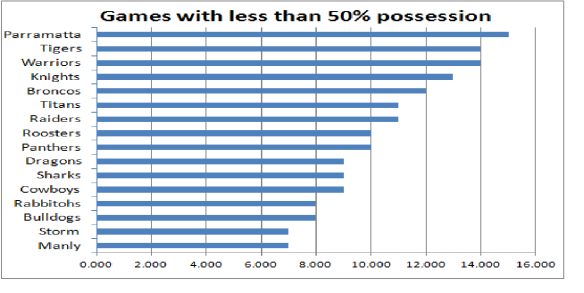
It’s hard to believe he would instruct his own team to do this (and didn’t).
And just ask the NSW State of Origin team how Origin 2 felt after 20 minutes this year. The answer would have been ‘exhausted’, I’m sure. The game was effectively over at that early point. But let’s not dwell on the facts …
For any team to be instructed to do this in a finals series when they face sudden death is prima facie evidence for incompetence of the coaching staff, and grounds for dismissal, which is why they don’t do it. Teams will back themselves to withstand extra pressure to be sure, but they certainly do not seek it.
So my message to Manly and Toovs is this – keep calling the referees out for incompetence. Ricky did it earlier in the year and accepted the fine, which was a mistake. The fine is there for implying bias, not for unveiling the referee clown show for what it is.
Keep calling out the grading system relating to suspensions for leniency, and the NRL for double standards and inconsistency.
And when the former referees boss, Bill Harrigan, can single out Jeff Lima for a 10 week suspension for an obvious attack on the structure of another man’s leg, why can’t a coach mention it in passing? The MRC aren’t that malleable and easily influenced, are they?
Oh, right …

Bro do you even rugby league
If you’re asking if I play rugby league, the answer is no. Time has caught up with me when it comes to playing football, as it does everyone.
Thank you for your comment, but other than that, I’m not quite sure how to answer your question.
If you find something objectionable, please let me know.
I would love to hear your thoughts and solutions.
Cheers,
Dr NRL
What’s that got to do with anything?
Great article, hopefully the referees will read it and take notes. I have no idea why the sin bin exists when it isn’t used, IE: Cooper Cronk against the knights on the weekend.. Blatant! He had guilt written all over his face and should have been sent for at least 10 minutes, but then again he does play for the storm and is seemingly untouchable.
I love the footy season but each year I get increasingly frustrated with the way it’s run on and off the field. Do you think we will ever see another game where the ref doesn’t go to the video before blowing his whistle? Scrums are just a waste time, they are nothing but opportunities for the players to have a rest, which would be fine if the game wasnt being stopped constantly to look at the video! Shoulder charges have been banned, but it comes down to the referees interpretation. Why investigate drug use when ASADA take all season to make a decision. And don’t get me started on the State if Origin! These used to be the best games of the season. You may as well rename it State of Choice. Greg Inglis playing for QLD, what a joke! Corbin, Tariq & Ashton Simms (brothers) come from Gerringong NSW, played all their junior footy for Gerringong & played for Illawarra in reps, and now Corbins allegiance is for QLD & Tariq would play for NSW. Yet a New Zealander is happy to play for the blues.. Go figure!
Thanks, glad you got something out of it.
Other than the link provided near the end of the blog (where there is specific mention of the sin bin rule), you might like to have a look at a couple of earlier thoughts on the subject of referees –
… amongst others.
You can see that I’ve had them in my sights since the inception of this blog, simply because I feel they are ruining the game with very little intervention from the NRL.
Most referees are not up to it by a long shot, and that extends to the video referees who make inexplicable mistakes. So much for having ex-players in the box to get a bit more ‘feel’. They don’t know the rules, don’t know how to apply them, and are a bit of a rabble. They will therefore continue to 2nd guess and use the video option when making decisions in my view. They just fail to appreciate the spirit of the game, and so yes, I’m as frustrated as you.
The shoulder charge ban was a poor decision because it failed to appreciate the difference between symptom and cause. The issue is head contact, not shoulder charges. It just so happened that many shoulder charges were leading to head contact (in my opinion because players are so much larger now, and it’s an easier, less risky target for the defender). The easiest option was to simply penalise head contact in any form. If the NRL was so concerned, they would have come down forcefully on punching and spear tackles, yet they couldn’t even sin bin players earlier in the season for potential back breakers.
I do like scrums, though. Set plays have a place in the game as I see it. And by aggregating players in a scrums, it opens the field for the backs, particularly mid field scrum that provide more attacking options. Not everyone would agree with me, though, but I’m sure we’d miss them terribly if they were gone.
Go the (insert team here)!
Dr NRL
Truly golden stuff, and a must read not just for Roosters fans but NRL fans and conspiracy theorists in general. Some of these idiots forget that to win a game, you need the ball — not giving it back for repeat sets.
Where was the ABC when Manly were flogged in the penalty count, got touched up by Souths and then had Toovey rip the referees a new one? Did Manly intend for all that to happen?
Just a bizarre argument that has taken off for no other reason than the Roosters and Manly are in the top four. The ABC article really failed to mention that the Eels and Tigers are in the top four in penalties conceded as well — but that would be inconvenient to discuss, wouldn’t it?
Heaven forbid anyone in league disagree with Wayne Bennett on penalties! If he says it, it must be true. Even the Tele guy on Back Page was suckered into it last night. Sigh.
That recent Souths-Manly match was interesting. Very similar to the Round 1 match, Souths-Roosters – ie. the Bunnies received at least twice the amount of penalties, and won both matches by similar amounts. Puts a large hole in the theory.
Perhaps the ABC’s point is that Manly and the Roosters just weren’t ‘doing it right’, or that they’re inconsistent in their subversive strategy, and just so happen to be consistently good.
Was it James Hooper? If so, I expected as much, meaning I expected very little.
Great point on those penalty counts. Roosters were decimated by some horrible refereeing calls in the Melbourne match this year, one o their four losses. But according to popular thinking, they wanted that.
Such an absurd premise that has taken off like a meme.
Great article. I have passed it on to some people.
Great stuff. The more the merrier!!
Mate, thanks for stating the obvious in the most eloquent way possible. You said everything and the illustrations, particularly the penalty differentials, show just how much the roosters have been butt raped by the NRL.
Thanks for putting that pathetic, stupid moron from the ABC in his place. Of course the agenda drivers will still believe what they want to believe.
Thanks Brendan. Those penalty counts go beyond common sense. It’s interesting that this week we have the most heavily penalised team playing the least penalised. Should be a ripper penalty count. Even the Round 19 match had the Sharks winning the penalty count 8-5, despite having only 40% of possession, and losing 40-0.
Rooster will be the 2013 premiers …. nuff said.
Great Article !
On Peter Sterling’s show, this week, there was a graph showing that the vast majority of the penalties the Roosters concede are the ones that piggy back opposition teams down the field. Sort of flies in the face of what that ABC moron had to say. No facts, no sense , just opinionated drivel. The perfect person for a job at the Astonisher.
I would say that this is far worse for the Roosters (or any team with this penalty configuration), simply because it gives teams a free 40 metres coming out of their own end (kick + 10m restart) or more.
A penalty close to the line just gives the attacking team a few more tackles. Unless they get a penalty on the 5th tackle, the defending team doesn’t need to defend any kicks twice, and doesn’t give up ground.
I think the distribution of penalties as seen on the Sterlo show is very odd.
I would be very interested to se the same statistics put together for the last 10 years. The Roosters have been behind the eight ball with penalties for as long as I can remember. Even given the large turnover in players and coaches in that time, surely the consistency bias could follow one club it is constantly changing. I think most refs hate Manly and the Roosters and go into games with this attitude.
Great Article. Couldn’t have said it any better. The Roosters are smashed week in week out on the penalty count because we are perceived as the rich, latte-sippers from bondi. When we win the grand final this year against either melbourne or souffs after the inevitable 7-3 penalty count, it will be the greatest grand final win of all-time.
Even tough guys drink latte and chardonnay … ahem … but the penalty counts and right side are the Roosters weak points.
Early on I mentioned the Roosters had a centres problem. Jennings has improved and doesn’t seem to bomb the draw and pass any longer, but SKD on the right could cost them.
Semi final football defending a penalty count 2x higher or more than your own is a recipe for disaster – for any team.
Looking forward to tonight’s penalty count – best vs worst.